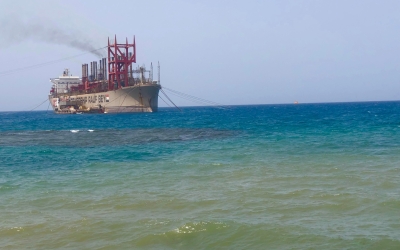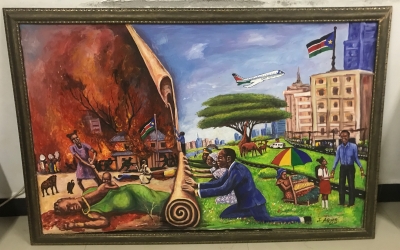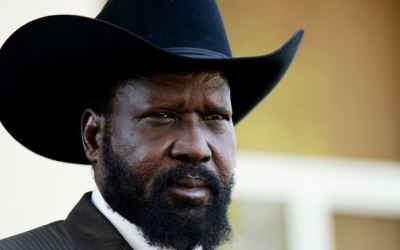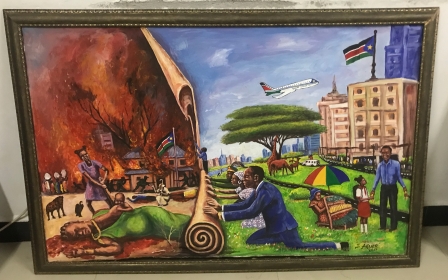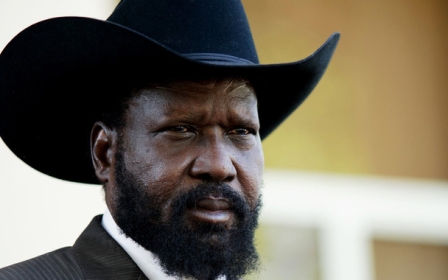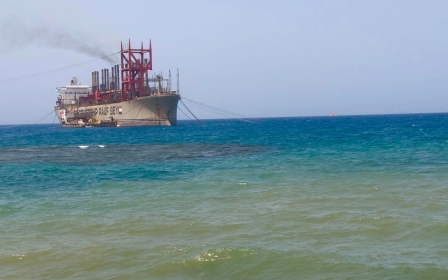'Time to go home': South Sudanese cautiously welcome unity government
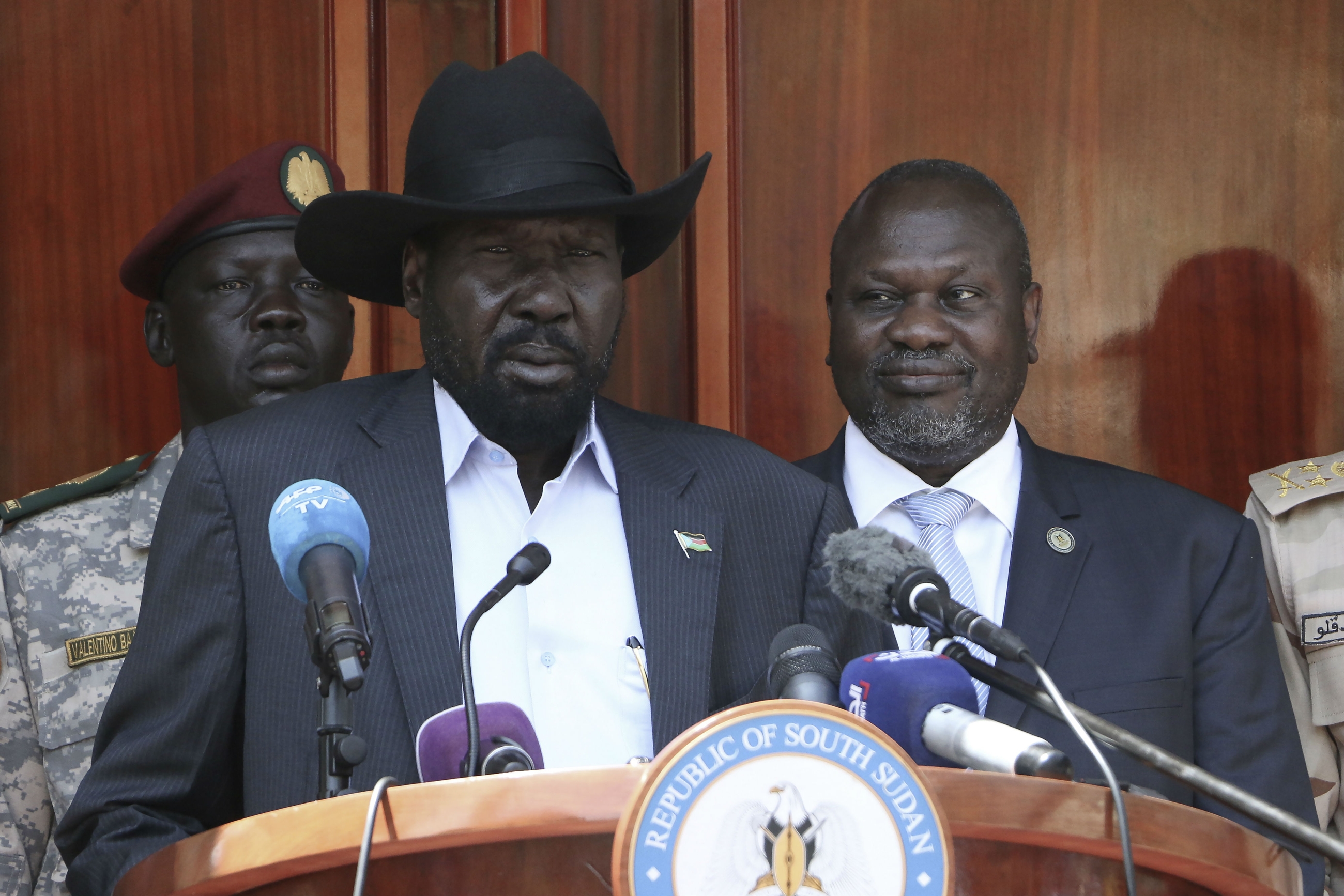
South Sudan rebel leader Riek Machar was sworn in as first vice president on Saturday, formally rejoining the government in the latest bid to bring peace to a nation ravaged by six years of war.
"I do hereby swear that I shall be faithful and bear diligence to the Republic of South Sudan," Machar said in his oath in front of a room packed with diplomats, the leader of Sudan General Abdel Fattah al-Burhan and other regional representatives.
New MEE newsletter: Jerusalem Dispatch
Sign up to get the latest insights and analysis on Israel-Palestine, alongside Turkey Unpacked and other MEE newsletters
Machar embraced and shook hands with his bitter rival President Salva Kiir Myardit, with whom he will be attempting to govern for the third time since the country's independence in 2011.
The pair finally agreed this week, under strong pressure from the region and abroad, to go ahead with a unity government which was the cornerstone of a September 2018 peace deal.
Kiir on Friday dissolved his government ahead of the formation of the new government on Saturday.
The deal has inspired hope among Southern Sudanese, especially those who are refugees in neighbouring countries like Sudan, Kenya and Uganda, that the years of killing and displacement are over.
'Brave step and decision by President Salva Kiir'
The compromise made by Kiir in accepting the reversal of the subdivision into 32 states and the return to the original 10 states and three administrative areas of Abyei, Pibor, and Ruweng has been cautiously welcomed by the both citizens and political parties.
South Sudan brokered a peace agreement in Sudan in 2017, but the issue of the 10 states had been pending and became one of the main outstanding issues between the government and the opposition.
South Sudan leaders had also signed a peace deal in neighboring Ethiopia in 2015, but it collapsed after fighting broken out again inside the capital Juba between the forces of Kiir and Machar.
A Southern Sudanese official said that the reduction of the states from 32 to 10 had resolved the main pending issues and paved the way for the agreement.
The source, who asked for anonymity because he was not authorised to talk to the media, told Middle East Eye that the unity government would be based on quotas already agreed upon in the 2017 agreement.
"We believe that this brave step and decision by President Salva Kiir will pave the way for the peace and stability of the country, we hope the other parties, especially the opposition, will be serious in the constructive engagement for the implementation of the agreement," he said.
Opposition welcome breakthrough
The majority of political parties have welcomed the decision over the formation of the new government.
The main opposition party, the Sudan Liberation Movement/In opposition (SPLM/IO), which is led by Machar, welcomed the breakthrough and his appointment as first vice president.
SPLM/IO spokesman Pouk Both told MEE that Kiir's decision to return to the original 10 states would solve the obstacle of land disputes and boundaries in the country.
"We strongly welcome President Salva Kiir’s order to revert to the original 10 states because it resolves disputes over land and boundaries in South Sudan," he said.
Olaw Adiang, South Sudan Head of Secretariat of the Joint Transitional Security Committee, also welcomed the breakthrough, saying the main priority now was the implementation of the agreement itself.
"If implemented in letter and spirit it leads to a democratic, stable South Sudan," he told MEE.
"The next step is the formation of a presidency composed of five vice presidents, 35 ministers and 10 deputy ministers.
"Plus 10 state governments, three administrative areas and 550 members of parliament."
Multiple challenges
However, Adiang said that some challenges could obstruct the implementation of the agreement.
"The challenges are lack of political will, lack of resources and the level of corruption," he said.
"It seems the parties are not interested in implementing the security arrangements and transitional justice."
SPLM/IO spokesman Both rejected the formation of the three administrative areas, considering this as another area of disagreement between the government and opposition.
"This issue of new administrative areas has to be resolved if President Salva and his government mean to solve the issue of the states and their boundaries by confirming what was agreed upon at the tripartite consultations in Addis Ababa, Ethiopia on February 10 to revert the country to the former 10 states,” he said.
"However, we don't except the establishment of the Abyei, Ruweng and Pibor administrative areas because they were part of Warrap, Unity and Jonglei respectively.
"Justification is needed from the government side of why they should be curved out."
Mutual interests
Spokesman Both also said that there were other challenges regarding the deal's security arrangements, including the deployment of the UN peacekeeping mission, humanitarian corridors and the separation of the two sides' forces.
"There is another outstanding issue that might cripple the formation of R-ARCSS on February 22 which is the issue of the security arrangements and the deployment of the UNMISS troops in the major towns, civilian centres and lifeline routes," said Both, referring to the Revitalised Agreement on the Resolution of the Conflict in the Republic of South Sudan.
"It was discussed also in Addis Ababa. but any decision was deferred to the next forthcoming tripartite meeting."
Adiang said that the two countries were putting pressure on the opposition from both sides in order to push for finalizing the peace process in the two nations.
"Sudan played a great role in persuading the opposition to accept the formation of the government without proper security arrangements; this move will push the South Sudan government to reciprocate and push the Sudanese opposition to give real concessions and sign peace with the government," he said.
'It's the time to return home'
In the meantime, South Sudan refugees in Sudan, Uganda and Kenya have welcomed the agreement, calling on the government to implement it honestly and pave the way for their return to their homeland.
Moses Awei, a refugee in the Sudanese capital Khartoum, told MEE that he wanted to see his homeland in Equatorial state and to bring his family home as well.
"We have suffered enough, and we need to have some rest in our country, the Southern Sudanese have been displaced for decades since the war against the North and the government of [former President Omar al-] Bashir," he said.
Benjamin Okij, a refugee in Uganda, also told MEE that millions of Southern Sudanese were waiting for this moment as they had suffered from having no future, no hope and no jobs for a long time.
"It's the time to return home and the time to stop war and the time of reconciliation among the southern Sudanese," said Okij.
"I hope all our politicians will be responsible and serious this time and don't waste this opportunity to make peace a reality in South Sudan."
Margret Agostino, a Southern Sudanese student at Nairobi University, told MEE that the community of Southern Sudanese in Kenya were preparing to celebrate the peace deal.
"We are proud of our leaders who are now making the peace a reality... we say that may God bless them and help them to continue this mission," she said.
'Government hasn't enough money'
South Sudan political analyst Mathiang Cirilo told MEE that the president's decision was a big breakthrough in the peace process.
However, he added that there are still many challenges head and a deep need to bridge the gap between the government and the opposition, beginning by confidence building.
"There are still many outstanding issue despite the big breakthrough that was made, including the security arrangements, the issue of the three administrative, among other issues," he said.
"Also the implementation of the agreement needs to be funded, and it's clear that the government hasn't enough money to do that.
"Also we are in need of deep reconciliation between the government and the opposition, as well as among the communities themselves, and the agreement needs the support of the regional and international community."
Middle East Eye delivers independent and unrivalled coverage and analysis of the Middle East, North Africa and beyond. To learn more about republishing this content and the associated fees, please fill out this form. More about MEE can be found here.


